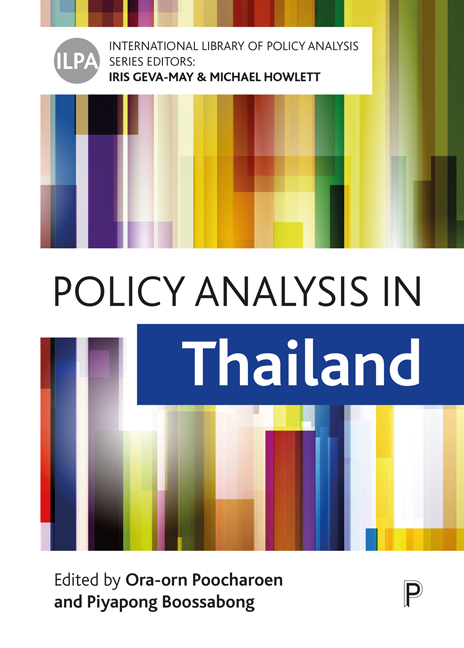Book contents
- Frontmatter
- Contents
- List of figures and tables
- List of abbreviations
- Notes on contributors
- Editors’ introduction to the series
- Introduction
- Part One History, styles and methods of policy analysis in Thailand
- Part Two Policy analysis within executive government
- Part Three Policy analysis beyond executive government
- Part Four Political parties and interest groups in policy analysis
- Part Five Policy analysis education and research
- Index
seven - The role of the Thai military in policy analysis: unpacking three faces of the military in the non-military policy domain
Published online by Cambridge University Press: 20 January 2024
- Frontmatter
- Contents
- List of figures and tables
- List of abbreviations
- Notes on contributors
- Editors’ introduction to the series
- Introduction
- Part One History, styles and methods of policy analysis in Thailand
- Part Two Policy analysis within executive government
- Part Three Policy analysis beyond executive government
- Part Four Political parties and interest groups in policy analysis
- Part Five Policy analysis education and research
- Index
Summary
Introduction
Political changes in Thailand have been profoundly associated with the intervention of the military in domestic politics and policy analysis processes. With 12 successful military coups since 1932 (Tamada, 2019: 272), it has become politics-as-usual in Thailand when the military steps in to end political conflicts and stays in power to oversee the post-coup political arrangements. This striking feature in Thai politics points to the military's decisive role in shaping the country's political outcomes. Although the military regime has become outmoded in the context of expanding global democracy, the case of Thailand speaks differently. It illustrates that the military's political influence is far from limited as reflected by the fact that the military has been actively involved in public policy-making processes. This chapter investigates the Thai military's wider involvement in public policy-making processes in the wake of the past two successful coups. In particular, it closely inspects three non-military domains which explicitly characterise the military's permeating role in shaping policy analysis and policy outcomes, namely internal security, development and telecommunications policies.
The existing scholarship on the role of the military in Thai politics is sated with an analysis of either civil– military relations in the context of democratisation or military coups and their political consequences (Panduprasert, 2013; Tantikul, 2014; Bamrungsuk, 2015; Bunbongkarn, 2019). To put the case of Thailand in comparative perspective, the civilian– military relations literature analysing the expansive role of the military in the new nations illustrates that after the military seizes state power, it has to mobilise mass support (Janowitz, 1964). This indicates that the military's political intervention comes with additional civilian actions. Among other things is the participation in policy-making processes to ensure its interests are protected. While the bulk of similar literature is in place, less attention had been paid to the military's influence on public policy making in Thailand, except for Bunbongkarn's (1988) work that already highlighted a wide array of non-military affairs in which the military participates. This lacuna dictates academic exploration.
- Type
- Chapter
- Information
- Policy Analysis in Thailand , pp. 137 - 154Publisher: Bristol University PressPrint publication year: 2023



